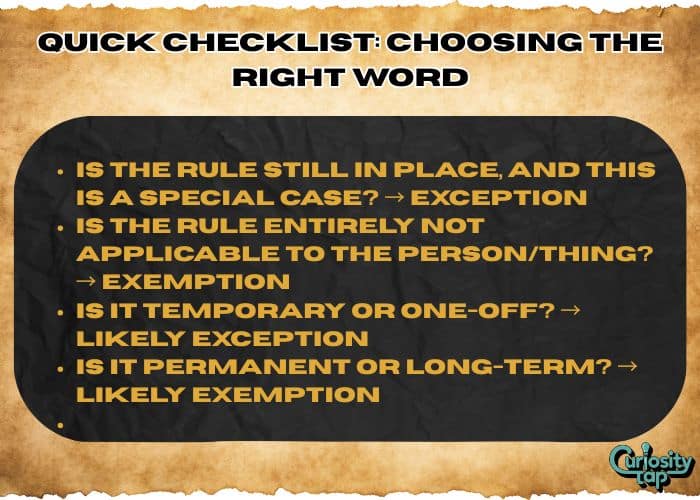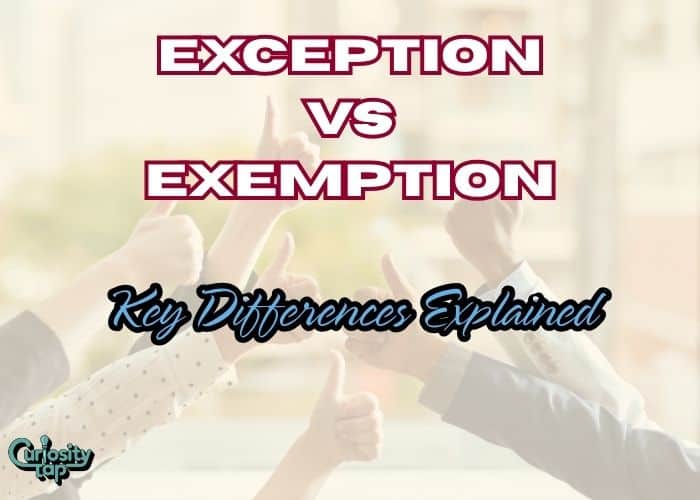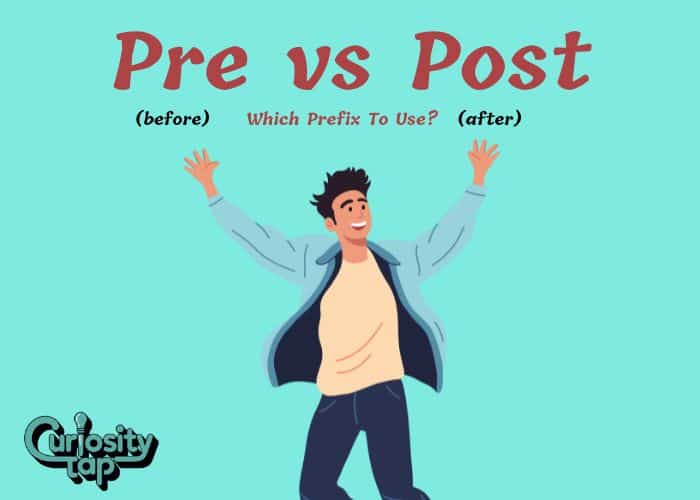Ever been reading a legal document, workplace policy, or tax rule and paused at the words exception vs exemption, wondering if they meant the same thing? You’re not alone.
These two terms often appear in formal writing especially in law, education, and taxation but while they sound similar, their meanings and applications are quite distinct.
By the end of this guide, you’ll be able to confidently use each term in the right context, saving yourself from embarrassing mix-ups and ensuring crystal-clear communication.
Understanding the Basics
Before diving into the differences, let’s define each term clearly.
What Is an Exception?
An exception is a case or situation that does not follow the general rule, but the rule still exists for others.
Think of it as a specific carve-out from an otherwise consistent standard.
Example:
“All employees must attend the weekly meeting, except those on approved leave.”
Here, the meeting rule stands, but certain people are exceptions.
What Is an Exemption?
An exemption is a release or freedom from an obligation, duty, or rule altogether.
It’s not about bending the rule it’s about not being bound by it at all.
Example:
“Students with medical certificates are exempt from the physical education requirement.”
In this case, those students aren’t just exceptions to a class they are completely freed from the obligation.
Key Differences Between Exception and Exemption
| Aspect | Exception | Exemption |
|---|---|---|
| Definition | A case not following the rule but still under the system’s scope | A complete release from the rule or obligation |
| Nature | Rule exists, but one case deviates | Rule does not apply at all |
| Example | All cars pay tolls, except emergency vehicles | Disabled drivers are exempt from road tax |
| Duration | Often temporary or situational | Can be permanent or long-term |
| Legal Use | “Exception clause” in contracts | “Tax exemption” in finance and law |
Real-Life Example: How It Plays Out in Law and Taxes
Imagine you run a small bakery in a city with strict food safety rules.
- Exception scenario:
The city requires all bakeries to close by 8 PM, but during a cultural festival, your bakery is allowed to stay open until midnight for three days. The law still applies your case is simply an exception.- Exemption scenario:
Your bakery operates in a designated “heritage food zone” where closing hours don’t apply at all. This is a permanent exemption, not just a temporary allowance.
This illustrates why confusing these terms can have major consequences in contracts, compliance, and daily operations.
When to Use Each Term
✅ Using Exception Correctly
- In policies where a general rule exists but a case deviates
- In contracts with “exception clauses”
- In grammar or logic to denote “case apart from the rest”
Example sentence:
“The no-pets policy has one exception service animals are allowed.”
✅ Using Exemption Correctly
- In tax, law, or regulatory contexts where the rule doesn’t apply
- In healthcare, disability, or special status situations
- In education waivers
Example sentence:
“Low-income families may qualify for an exemption from tuition fees.”

Quick Checklist: Choosing the Right Word
- Is the rule still in place, and this is a special case? → Exception
- Is the rule entirely not applicable to the person/thing? → Exemption
- Is it temporary or one-off? → Likely Exception
- Is it permanent or long-term? → Likely Exemption
FAQs
Is an exception the same as an exemption?
No. An exception is a case that deviates from the rule, while an exemption is complete freedom from the rule.
Can someone have both an exception and an exemption?
Yes, in rare cases. For example, a person may have a tax exemption for property tax but also an exception to late filing penalties.
Which term is more common in law?
Both are common, but “exemption” is more frequent in taxation, while “exception” often appears in contracts and statutory clauses.
Is exemption always permanent?
Not necessarily. Temporary exemptions exist, such as pandemic-related business tax exemptions.
How do I remember the difference?
Think: “Exception = special case; Exemption = total release.”
Pros & Cons of Using Each Term in Policy Writing
Exception
Pros:
- Flexible and situational
- Allows nuanced rule-making
Cons:- Can create ambiguity if not clearly defined
Exemption
Pros:
- Clear and absolute
- Simplifies compliance for those exempted
Cons:- May be harder to justify legally
- Can be abused if criteria are too broad
Conclusion
While exception and exemption may sound similar, their meanings carry important differences especially in legal, business, and educational contexts.
Using the correct term not only improves clarity but can also prevent costly misunderstandings.
Next time you draft a policy or read a legal document, pause and ask: Is this a case that breaks the rule, or is the rule not applying at all?
Master this distinction, and you’ll communicate with authority.
Sources
Sources:
Read more knowledgeable blogs on Curiosity Tap
Is this article helpful?

Jackson Pearson is a passionate educator and language enthusiast behind the blog Jackson Pearson. With years of experience in teaching and writing, he specializes in simplifying complex grammar rules, breaking down tricky vocabulary, and crafting learning guides that are both engaging and practical. His mission is to help readers boost their English skills whether they’re beginners or brushing up for fluency. Through every article, Jackson brings clarity, structure, and a spark of curiosity to the world of English learning.



